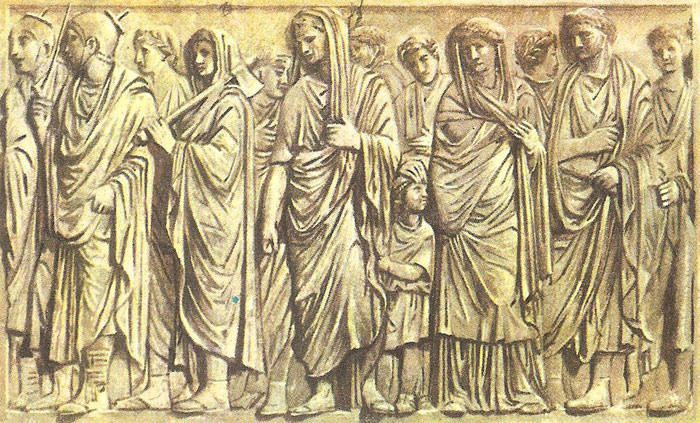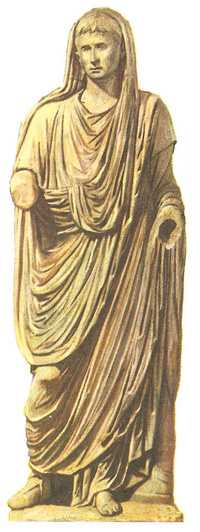Augustus

The family of Augustus, shown in a bas-relief on the Ara Pacis Augustae (Alter of Peace). Left: two priests; center (with toga over his head): Agrippa; the boy Gaius; Julia (behind); his wife Livia; and Tiberius.
Octavian obtained supreme power over Roman Empire by defeating first the murders of his adoptive father Julius Caesar and then his great rival Mark Antony. He strengthened that power, and gave the Empire a constitution (body of fundamental principles according to which a state is governed) that survived with little change (except of emphasis) for over two centuries. See also Caesar to Augustus.
 |
| State of Augustus, dressed as a priest
|
Octavian's advantages
After his victory over Antony at Actium in 31 BC, Octavian had several advantages. Most people had realized by now that the old Republican constitution, which had served Rome well enough when it was a small city-state, was inadequate for the needs of a large empire.
Moreover, most of the leading men (principes) from great Republican families, who would have opposed any constitutional change, were now dead: they had perished either in the battles of the Civil Wars, from Pharsalus to Actium, or in exile. In their place were new men, many of them from leading families throughout Italy. These new men had prospered under Octavian's rule and were determined to keep what they had gained. Octavian knew, therefore, that he could count on their solid support - quite apart from the oath of loyalty to himself which all Italy had been induced to take before the battle of Actium.
But, above all, there was a universal desire for peace, and for an end to the unsettled conditions of the past 40 years.
Augustus' first constitutional settlement Because of the Romans' intense dislike of changes being introduced into their established systems, Octavian wanted to make his power strong and stable by wielding it as far as possible within the framework of the Republican constitution.
On 13 January 27 BC Octavian formally resigned all his powers to the Senate. In theory, the Republic was thus restored. But the Senate, full of his own supporters, insisted that he should take a special command with proconsular power (imperium) for ten years over Spain, Gaul, and Syria. The Senate also gave him the title Augustus (a Latin word meaning majestic, stately, or highly admirable): it is by this name that he was known from this time onwards.
By accepting this proconsular command, Augustus became in theory no more than a Republican magistrate with a commission such as Caesar and Pompey had held. In practice Augustus was taking over three areas that held large armies. None of these was to be governed by some other proconsul, powerful enough to threaten Augustus's supremacy and the peace of the Empire. Moreover, Augustus retained sufficient power in Rome by being consul himself continuously from 31 to 23 BC, the other consul being one or other of his most trusted supporters.
Tribunician power
This system worked fairly well for some years. But in 23 BC, after a very serious illness, Augustus decided for various reasons to give up the consulate, and to assume instead two less obvious but actually much wider powers:
The Princeps
Augustus held, in fact, the power of a king, and is considered the first Roman Emperor. Wisely concealing this fact, he preferred to be called the Princeps, the leading citizen.
Augustus was responsible for a great program of public building in Rome. He claimed that he found Rome a city of brick, and left it a city of marble. He was also responsible for giving the Roman Empire good government, and stable and defensible frontiers. He encouraged literature; and he attempted a moral and religious revival.
The Succession
From the time of his illness in 23 BC, Augustus was deeply concerned that after his death there should be a successor to his power who would continue his system: if possible, a successor from his own family. But from his three marriages he had only one daughter, Julia. He married her first to his nephew Marcellus (but he died in 22 BC), then to his trusted friend Agrippa (but he died in 13 BC). When Agrippa's sons Gaius and Lucius, whom Augustus had adopted, died in their turn (In AD 4 and AD 2 respectively), Augustus adopted his stepson Tiberius, who succeeded Augustus after his death in AD 14. Like his adoptive father Julius Caesar, after death Augustus was worshipped as a god.
